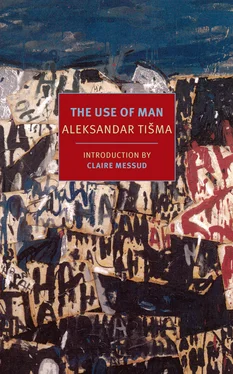Aleksandar Tišma - The Use of Man
Здесь есть возможность читать онлайн «Aleksandar Tišma - The Use of Man» весь текст электронной книги совершенно бесплатно (целиком полную версию без сокращений). В некоторых случаях можно слушать аудио, скачать через торрент в формате fb2 и присутствует краткое содержание. Год выпуска: 2014, Издательство: NYRB Classics, Жанр: Современная проза, на английском языке. Описание произведения, (предисловие) а так же отзывы посетителей доступны на портале библиотеки ЛибКат.
- Название:The Use of Man
- Автор:
- Издательство:NYRB Classics
- Жанр:
- Год:2014
- ISBN:нет данных
- Рейтинг книги:5 / 5. Голосов: 1
-
Избранное:Добавить в избранное
- Отзывы:
-
Ваша оценка:
- 100
- 1
- 2
- 3
- 4
- 5
The Use of Man: краткое содержание, описание и аннотация
Предлагаем к чтению аннотацию, описание, краткое содержание или предисловие (зависит от того, что написал сам автор книги «The Use of Man»). Если вы не нашли необходимую информацию о книге — напишите в комментариях, мы постараемся отыскать её.
A work of stark poetry and illimitable sadness,
is one of the great books of the 20th century.
The Use of Man — читать онлайн бесплатно полную книгу (весь текст) целиком
Ниже представлен текст книги, разбитый по страницам. Система сохранения места последней прочитанной страницы, позволяет с удобством читать онлайн бесплатно книгу «The Use of Man», без необходимости каждый раз заново искать на чём Вы остановились. Поставьте закладку, и сможете в любой момент перейти на страницу, на которой закончили чтение.
Интервал:
Закладка:
11
The German offensive to the east, which reached Novi Sad and the Bačka in April 1941, had in the winter of that year its own representative in the Kroner house. Sep Lehnart, Reza Kroner’s brother, had been given leave from the battles in Russia and very quickly exhausted any wish to pass his free time with his mother in their village, where his new black boots had nowhere to wander but the muddy, deserted streets. In the village, what he missed most were worthy listeners, for even in the heat of battle he had looked forward to telling his adventures. Not, however, to his sixty-year-old mother, who would pity rather than admire him, accompanying his words with sighs as the tears rolled down her wrinkled face. Nor to the well-fed peasants, who would squint at him doubtfully or ask him how things were over there where he had come from, what the houses and stables in Russia were like, the cattle and barns.
Sep himself had never been a true peasant. Left without a father, with an indulgent mother and an uncle who secretly tried to cheat him of his property, he went to work early, just as Reza had done, for a local Jewish merchant. Perhaps that Jew, the blond-bearded Solomon Heim, was the one person Sep could tell about his military exploits, showing him who he was now, and frightening him out of his wits, thus avenging himself for all the blows and heavy work he had been subjected to as a young apprentice. But when he got home, he learned that Heim and his twenty-year-old son, who was the same age as Sep and a bad example for him, twisted as he was by envy, had been killed by the Hungarian police in the course of the mop-up operation a few weeks previously, and that Mrs. Heim, after burying them, had gone off to her sister in town, leaving the house and shop boarded up.
Sep spent days hanging around that house with mixed feelings of curiosity and regret, asking the old customers who happened by exactly how his former employer had been killed, and where, and if he had died immediately from the bullets, and if he had cried out, and what his son had done — silently comparing what he heard with the experiences he had accumulated himself. When there was nothing left to hear, Sep packed his suitcase and left for the Kroners’ in Novi Sad. He was prudent enough not to tell anyone in the village where he was going, but within the small circle of those who knew, it caused no little confusion: an SS soldier in a Jewish home!
The Kroner storeroom had already been requisitioned and its office occupied by a government official, Miklós Armanyi, of noble birth, to whom Kroner had been assigned as unpaid assistant. In the Kroner household, life was lived in uncertainty, as they received accounts of the killing of Jews and Serbs in the surrounding villages and watched the courtyard, now empty, deprived of its former bustle, as if stricken by plague. But now in that courtyard, early in the morning, oblivious of the frost, Sep Lehnart appeared, tall, slim, sinewy, his fair hair clipped close, his ears small and flat. Dressed in uniform trousers, shirt, and boots, he proceeded to go through his exercises.
First he would run around the yard three times. Then, standing at one end and with pauses for breath, he would begin the knee bending, arm and leg stretching, waist twisting, and head-turning workouts as if his neck were a piece of string. He would proudly tell his sister, after asking for breakfast in the kitchen, how much good all this exercise did him, explaining to her in detail which movement was beneficial for which part of the body, just as he had been taught in the army, and he would reproach her for not having encouraged her own children — his nephew and niece — to similar efforts, but letting them lie around in bed and begin the day as weaklings, which could only hurt them later in life. With all this, he seemed to have forgotten about the children’s origins, which by the laws of racial purity condemned them to a life of slavery, if not, indeed, a premature and violent death. It was as if they were not half-Jews, but little Aryans, who tomorrow, like him, would carry a gun and the day after tomorrow, when peace reigned, take part in building the new Europe.
And truly, with half of his divided being — the half that against all caution had driven him to come to his sister’s from the village — he believed this. Making his way into the elite German corps from his obscure village, he had enthusiastically embraced its teaching, which had raised him up — as once the tap of a sword on a knight’s shoulder had done — among the predestined masters of the world. But because he considered that teaching to be perfect, he could not even begin to entertain the idea that it might harm anyone near to him. His niece, Vera, and his nephew, Gerhard, were close blood relations, the more so since he, as yet unmarried, had no children of his own, but also because the poverty of his childhood had made him proud that his sister had married a rich merchant, despite the fact that the merchant was a Jew.
“Jew,” to Sep, meant a being rather like himself, an alien in Yugoslavia, but more mobile and more resourceful than his own kin, because independent of any nation. His service with Heim, the lessons and beatings Heim gave him, only served to confirm the idea of supremacy through fear; the SS instruction in the barracks had added darker, severer tones to this idea, but without changing its essence.
In Sep now there was a dualism of respect and fear, of envy and hatred. It was the gentle side that predominated when he looked at his own — so young — blood relations, his sister’s children, and in the mornings he could hardly wait to see them up and dressed, although he scolded them for rising late and neglecting their exercises in the open air, the only lessons he could recommend with self-assurance. He was particularly fond of Gerhard, who bore a striking likeness to him — thin, muscular, and fair-haired, with a narrow face, straight short nose, and hollow cheeks. By his nature, too, Gerhard seemed to be of the same mold as the soldier, for like Sep he had little talent for complicated, patient work. It was for that reason that the boy had never even stolen a glance into his father’s office. On the other hand, real exploits, actions demonstrating force and supremacy, inspired his utmost respect.
At that time Gerhard had finished his secondary schooling but was barred, because of his Jewishness, from continuing his studies, for which, in any case, he had no real interest. He had already come to an agreement with several other youngsters of similar outlook — to escape across the Danube before they were rounded up for forced labor, and join the Partisans. The arrival of Sep Lehnart provided an unexpected but perhaps welcome incentive to take that step as quickly as possible. When he told his friends, Franja Schlesinger and the Karaulić brothers, of his uncle’s presence, he proposed at the same time that they kill him and seize his weapons, thus beginning their flight from the German Occupation with a deed of daring. None of the group could resist this attractive idea, which Gerhard put forward with all the passion of his highly purposeful being. So for them, the early days of the SS man’s stay in Novi Sad passed in earnest discussions of how to get rid of him.
The Karaulić brothers and Schlesinger paid a special visit to Gerhard when they knew his uncle would be at home, so Gerhard could introduce them and they could look him over — take his measure, so to speak — which they did whenever he turned his back to go from one room to another. His revolver hung in its holster on a coat hanger in the entrance hall, underneath his cap and next to Robert Kroner’s dark-gray overcoat and hat. Their eyes often moved in that direction and exchanged significant glances. Should they kill him with a bullet from his own gun? Or with rat poison secretly put into his food? Or stab him with a knife, in the back, as he walked in their presence? Deciding on this last solution, which would attract the least attention and make the least noise, they came up against the problem of how to dispose of the body.
Читать дальшеИнтервал:
Закладка:
Похожие книги на «The Use of Man»
Представляем Вашему вниманию похожие книги на «The Use of Man» списком для выбора. Мы отобрали схожую по названию и смыслу литературу в надежде предоставить читателям больше вариантов отыскать новые, интересные, ещё непрочитанные произведения.
Обсуждение, отзывы о книге «The Use of Man» и просто собственные мнения читателей. Оставьте ваши комментарии, напишите, что Вы думаете о произведении, его смысле или главных героях. Укажите что конкретно понравилось, а что нет, и почему Вы так считаете.












